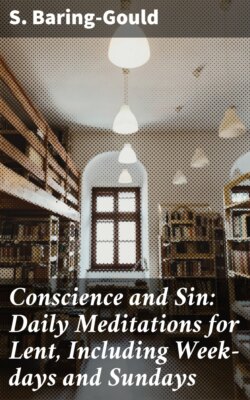Читать книгу Conscience and Sin: Daily Meditations for Lent, Including Week-days and Sundays - S. (Sabine) Baring-Gould - Страница 6
На сайте Литреса книга снята с продажи.
First Thursday in Lent.
ОглавлениеTable of Contents
THE NATURE OF CONSCIENCE.
1. Conscience, which is the gift of God bestowed on all men, Christian and heathen, is that practical judgment which points out to us what to avoid or what to do in any particular emergency that may arise. Just as we may know that there are certain laws of nature, and our ready commonsense tells us, when varying circumstances arise, how we are to act so that the laws of nature may be to our advantage instead of to our overthrow, so is Conscience the commonsense application of the indwelling consciousness of the distinction between right and wrong to emergencies, as they rise up and demand of us a choice between one course or another.
2. Conscience has a threefold exercise of its judgment.
(a) Before an action takes place, Conscience throws light on the action contemplated or proposed, tells us its moral value, and if the Conscience judges that it is good, then it counsels and permits the act. If, however, the Conscience judges that it is bad, then it dissuades from, and forbids the act.
(b) During an action Conscience is active, and in spite of all the clouds of prejudice and of passion that may have risen up, it bears testimony to the true nature of our conduct, it either encourages us to carry it through, not to be supine about it, not to abandon it before it is completed, and so leave it imperfectly accomplished, but to carry it through to the end, thoroughly and completely. Or else, Conscience does not cease from turning us aside from the prosecution of the act which it disapproves; it acts as a drag, a check, and unless resisted will completely arrest us in the prosecution of that which it esteems to be bad.
(c) After an action, Conscience recompenses us by the satisfaction we feel, the approval it accords to us for having either accomplished what it advised, or for having abandoned that conduct which it disapproved. So S. Paul speaks of people being “a law unto themselves,” shewing “the work of the law written in their hearts, their Conscience bearing witness, and their thoughts the meanwhile accusing, or else excusing, one another.” (Rom. ii. 14, 15.) This is the “testimony of the Conscience,” “the answer of the good Conscience” to which both S. Paul and S. Peter appeal.
3. We have seen that Conscience instructs, judges, and rewards or punishes; but we must consider further, that Conscience does not control the will of man, it merely dictates to the will what is right, and warns it as to what is wrong. It uses no constraint. Man’s will is free; Conscience clears the eyes of the mind, and shews it what conduces to welfare, and what to destruction, but it neither impels man irresistibly into the former course, nor holds him back forcibly from taking the other. It shows man what is medicine and what is poison, but it does not compel him to take one and reject the other, for the will of man is absolutely free.
